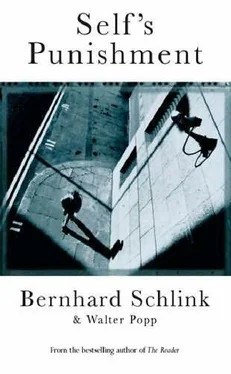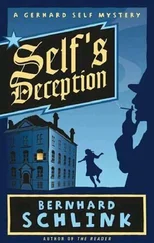‘Would you be willing to undergo a psychiatric examination? That would really facilitate the insurance company’s decision.’
‘Absolutely not. I’m not going to have them tag me as mad. If they don’t pay up right away, I’m going to a lawyer.’
‘If you go to trial you won’t be able to avoid a psychiatric examination.’
‘Let’s wait and see.’
The nurse came in carrying a little dish with brightly coloured tablets. ‘The two red ones now, the yellow one before and the blue one after your meal. How are we today?’
Sergej had tears in his eyes as he looked at the nurse. ‘I can’t go on, Katrin. Nothing but pain and no dancing ever again. And now this gentleman from the insurance company wants to make me out to be a cheat.’
Nurse Katrin laid her hand on his forehead and glowered at me. ‘Can’t you see how Sergej is suffering? You should be ashamed of yourself! Leave him in peace. It’s always the same with insurance companies; first they make you pay through the nose and then they torture you because they don’t want to cough up.’
I couldn’t add anything to this conversation and fled. Over lunch I noted down keywords for my report to the Heidelberg Union Insurance. My conclusion was neither that of deliberate self-mutilation, nor mere accident. I could only gather together the points that spoke for one or the other. Should the insurance not wish to pay they wouldn’t have a bad case.
As I was crossing the street, a car spattered me from head to toe in slushy snow. I was already in a foul mood when I reached my office and the work on the report made me all the more morose. By the evening I’d laboriously dictated two cassettes that I took round to Tattersallstrasse to be typed up. On the way home it struck me I’d wanted to ask Frau Mencke about little Siegfried’s tooth-extraction methods. But now I couldn’t care less.
It was a small huddle of mourners that gathered at the Ludwigshafen Cemetery at 2 p.m. on Friday. Eberhard, Philipp, the vice-dean of the Heidelberg faculty for the sciences, Willy’s cleaning lady, and myself. The vice-dean had prepared a speech, which, due to the low turnout, he delivered gracelessly. We discovered that Willy had been an internationally recognized authority in the field of screech owl research. And this with heart and soul: in the war, as an adjunct lecturer at Hamburg at the time, he had rescued the entire family of distraught screech owls from the burning aviary in Hagenbeck Zoo. The minister spoke about Matthew 6, verse 26, about all the birds beneath the heavens. Beneath blue heavens and on crunchy snow we walked from the chapel to the grave. Philipp and I were first behind the coffin. He whispered to me, ‘I must show you the photo sometime. I came across it when I was tidying up. Willy and the rescued owls, with singed hair, or feathers respectively, six pairs of eyes looking exhaustedly but happily into the camera. It warmed my aching heart.’
Then we stood by the deep hole. It’s like eenie, meenie, minie, mo. According to age, Eberhard is next, and then it’s my turn. For a long time now when someone I’m fond of dies, I’ve stopped thinking, ‘Oh, if only I’d done this or that more often.’ And when a contemporary dies it’s as though he’s just gone on ahead, even if I can’t say where to. The minister recited the Lord’s Prayer and we all joined in; even Philipp, the most hard-boiled atheist I know, said it aloud. Then each of us cast a small shovelful of earth into the grave, and the minister shook our hands, one by one. A young guy, but convinced, and convincing. Philipp had to return to work straight away.
‘You will come by this evening for a funeral meal, won’t you?’ Yesterday in town I’d bought another twelve little sardine cans and laid the tiny fish in a Escabeche marinade. To go with it there’d be white bread and Rioja. We settled on eight o’clock.
Philipp strode off like a Fury, Eberhard did the honours with the vice-dean, and the cleaning lady, still emitting heartrending sobs, was led gently on the arm of the minister to the exit. I had time and slowly wandered along the cemetery paths. If Klara had been buried here I’d have wanted to visit her now, and commune a bit.
‘Herr Self!’ I turned around and recognized Frau Schmalz, complete with small trowel and watering can. ‘I’m just on my way to the family grave, where Heinrich’s urn is at rest now, too. It’s looking nice, the grave. Will you come and see?’ She looked at me shyly from her narrow, careworn face. She was wearing an old-fashioned black winter coat, black button-up boots, a black fur hat over her grey hair pinned in a bun, and was carrying an imitation-leather handbag that made one wince with pity. In my generation there are female figures, the sight of whom rouses in me a belief in all the pronouncements of all the prophets of the women’s lib movement. Not that I’ve ever read them.
‘Are you still living in the old compound at the Works?’ I asked her on the way.
‘No, I had to get out, it’s all torn down. The Works found me somewhere on Pfingstweide. The apartment’s fine and everything, very modern, but you know, it is hard after so many years. It takes me a full hour to get to the grave of my Heinrich. Later today my son, thank God, will pick me up in his car.’
We were standing in front of the family grave. It was heaped high with snow. The ribbon from the wreath bequeathed by the Works, and long since decomposed, was fixed to a cane and rose up like a standard by the gravestone. Widow Schmalz put down the watering can and let the trowel drop. ‘I can’t do anything today with this load of snow.’ We stood there, both thinking of old Schmalz. ‘These days I hardly get to see my little Richard either. I live too far out. What do you think, is it right that the Works… Oh God, now that Heinrich’s no longer around I’m always thinking such things. He never let me, never let anybody question the Works.’
‘How much warning did you have that you had to leave?’
‘A good six months. They wrote to us. But then everything went so quickly.’
‘Didn’t Korten make a point of talking to your husband four weeks before your move, so that it wouldn’t be too hard on you?’
‘Did he? He never told me about it. He did have a close relationship with the general, you know. From the war, when the SS assigned him to the Works. Since then it was right what they said at the funeral, the Works was his life. He didn’t get much out of it, but I was never allowed to say that either. Whether SS officer or security officer, the fight goes on, he used to say.’
‘What became of his workshop?’
‘He set it up with such love. And he really cared for those vans and trucks. Then it was all got rid of very quickly during the demolition, my son could scarcely retrieve a thing. I think they scrapped it all. I didn’t think that was right either. Oh, God.’ She bit her lips and made a face as though she’d committed a mortal sin. ‘Forgive me, I didn’t mean to say anything bad about the Works.’ She grasped my arm appeasingly. She held on tightly for a while, staring at the grave. Thoughtfully, she continued, ‘But perhaps at the end Heinrich himself didn’t think it was right the way the Works was treating us. On his deathbed he wanted to say something to the general about the garage and the vans. I couldn’t understand him properly.’
‘You’ll permit an old man a question, Frau Schmalz. Were you happy in your marriage with Heinrich?’
She gathered up the watering can and trowel. ‘That’s the sort of thing people ask nowadays. I never thought about it. He was my husband.’
We walked to the parking lot. Young Schmalz was pulling in. He was happy to see me. ‘The good doctor… met Mum at Dad’s grave.’ I told him about my friend’s funeral.
Читать дальше












